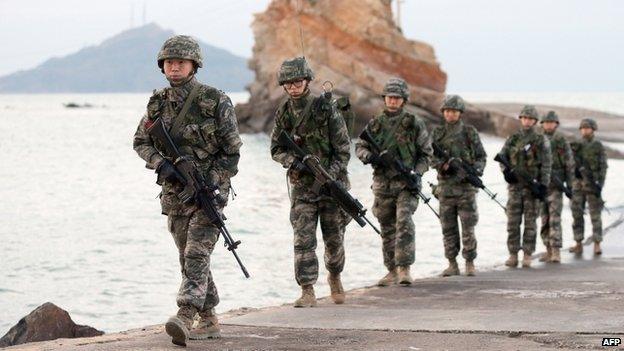North Korea in 'reconciliation' call to the South
- Published
- comments
Lucy Williamson: "Few people are taking this letter at face value"
North Korea has sent an open letter to the South calling for reconciliation and an end to "hostile military acts".
The letter, published in North Korea's state media, comes weeks before South Korea is due to hold joint military drills with the US.
South Korea dismissed the letter as having a "hidden motive".
Correspondents say that tensions on the Korean peninsula traditionally rise ahead of the annual drills, which Pyongyang has condemned as provocative.
Last year, the military exercises, known as "Foal Eagle", led to an unusually sharp and protracted surge in tensions. The North threatened pre-emptive nuclear strikes, as nuclear-capable US stealth bombers flew practice runs over the peninsula.
The military drills scheduled for next month are a source of great irritation to the North, which sees them as aggressive preparations for war.
While North Korea is appearing to offer reconciliation, its rhetoric has been accompanied by thinly-veiled threats not to "rashly reject" the proposals, the BBC's Lucy Williamson in Seoul reports.
The question on many minds is what the North will do when the drills go ahead, our correspondent adds.
'Getting on nerves'
"What is important for paving a wide avenue for mending North-South relations is to make a bold decision to stop all hostile military acts, the biggest hurdle stoking distrust and confrontation," the letter from North Korea's National Defence Commission (NDC) said.
"The DPRK [North Korea] has already unilaterally opted for halting all acts of getting on the nerves of South Korea and slandering it."

South Korean troops will soon take part in annual military drills with the US
"Regretfully, the South Korean authorities still remain unchanged in [their] improper attitude and negative stand," it said, adding that the South "should not thoughtlessly doubt, misinterpret and rashly reject our sincere, important proposal".
The letter was apparently sent by special order of North Korean leader Kim Jong-un. It calls on the South to take a bold decision to "stop all hostile military acts" and prevent "impending nuclear disasters".
South Korean defence ministry spokesman Wi Yong-seop said: "The most important military tactic is to figure out the enemy's hidden motive."
He added that existing tensions were the result of "North Korea's military provocations" and that "the current situation can be resolved if North Korea stops threatening and hostile rhetoric".
'Provoking and slandering'
This letter follows a proposal from the NDC a week ago that South Korea should cancel the annual drills with the US.
It also said the two sides should stop "all acts of provoking and slandering" each other.
Seoul has responded by warning that Pyongyang may be contemplating a provocative act aimed at triggering a confrontation.
In March 2013, North Korea made multiple threats against the South and the US following the "Foal Eagle" drill.
Pyongyang warned of a "pre-emptive nuclear strike" on the US, said it was scrapping the Korean War armistice, and closed the jointly-run Kaesong industrial park for months.
This round of exercises comes amid ongoing concerns over stability inside North Korea.
On 13 December, North Korea announced that it had executed Kim Jong-un's uncle, Chang Song-thaek, for "acts of treachery".
The apparent purge was unusually high-profile, with photographs of Mr Chang - a major powerbroker - being arrested and hauled in front of a military trial broadcast on state television.